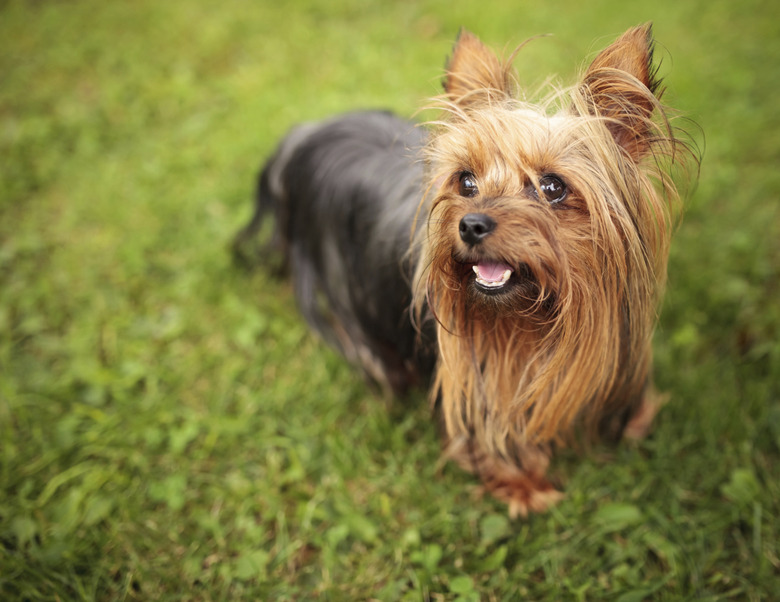How To Tell If A Yorkie Is The Right Weight
Yorkshire terriers, affectionately called Yorkies, are small, sprightly dogs who typically weigh no more than 7 pounds. While there is some size variation between individual dogs, maintaining a healthy weight for your Yorkie is important to ensure your pup lives a happy and healthy life. Monitor the weight on the scale and access his body condition to determine whether your Yorkie is the correct weight or if he needs to gain or lose a bit of weight.
Yorkie breed standard
Yorkie breed standard
Yorkies are small and compact toy dogs with long hair. Their bodies are well proportioned, and they carry themselves with head held high. They have long, flowing hair and erect, pointed ears.
Yorkies are affectionate and easy to train, and they need plenty of exercise and mental stimulation to stay healthy. The breed has few genetic problems but is prone to eye anomalies and luxating patella. To ensure your Yorkie lives a long and healthy life, make sure she maintains a healthy weight.
Healthy weight for a Yorkie
Healthy weight for a Yorkie
A healthy weight for a Yorkie is no more than 7 pounds. However, each dog is unique, and weight alone may not be enough to ensure your dog is at his ideal weight, especially for Yorkie mixes if you don't know what other breeds are present.
Besides the weight on the scale, evaluate your Yorkie's body condition score. At his ideal weight, your pup will have a visible waistline when you look at him from above. When you observe him from the side, he should have a tummy tuck. When you feel his rib cage, you should be able to easily feel his ribs, although they should not be visible.
Recognizing an underweight Yorkie
Recognizing an underweight Yorkie
Since there is no lower weight limit listed in the breed standard for Yorkshire terriers, evaluating body condition is the best way to determine if your Yorkie is underweight.
When a dog is underweight, the waistline and tummy tuck are more severe rather than being gently curved. In addition, the dog's ribs are visible, as are her spine and hip bone. Since Yorkies have long hair, you may not notice right away that the ribs are visible, but when you feel the ribs with your hands, you will be able to tell that the thin layer of fat that should be covering the ribs is missing. Severely underweight dogs will have a loss of muscle mass as well.
If your Yorkie is underweight, the first step is to consult with a veterinarian to rule out any illnesses that may be contributing to the weight loss. Work with your vet to find the best diet that will meet your dog's caloric needs. In addition, stress can make your dog stop eating, so take steps to identify any triggers and help your dog to relax and feel safe.
Recognizing an overweight Yorkie
Recognizing an overweight Yorkie
You are more likely to have an overweight Yorkie than an underweight one. In fact, it is estimated that more than half of the dogs in the United States are overweight. Yorkies weighing more than 7 pounds are considered overweight, but you should also evaluate body condition.
Overweight dogs start to lose their waistline and tummy tuck, and you will need to press hard to palpate the ribs. Severely overweight or obese dogs have fat deposits or rolls, especially on the face and base of the tail. Rather than a tapered waistline and tummy, the abdomen may appear round or distended.
Weight loss for dogs
Weight loss for dogs
Obesity not only shortens your dog's life but also increases the risk of diseases, including cancer, diabetes, and arthritis. Work with your veterinarian to rule out any medical conditions that may be causing increased weight and get treatment for any injuries or joint problems that may limit your pup's ability to exercise.
Talk to your vet to select a high-quality food and gradually decrease the portion size until you are feeding the amount recommended by your vet. Increase your dog's activity levels, making sure to walk your dog daily. Don't feed table scraps and avoid giving treats except during training sessions. Yorkies can also participate in activities, such as agility and obedience. These canine sports can help make exercise fun and will keep your Yorkie engaged.
